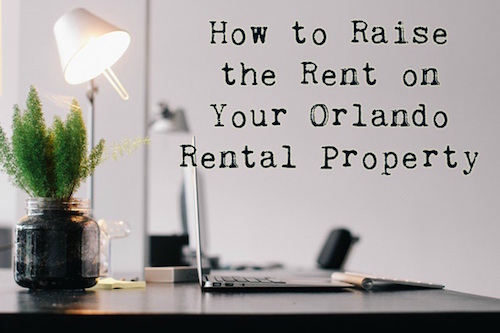
Like most industries, the rental market responds to economic trends. As such, raising rent is something that every landlord will unavoidably experience. However, raising the rent on your tenants is akin to asking your boss for a raise. It’s that difficult!
You may choose to raise rent for several reasons. For example, to accommodate tax increases, to pay for property maintenance and improvements, to match market rates, or simply to increase profits.
Raising the rent requires a blend of legal requirements, public relations with tenants, marketing research, and good business skills. The process of raising rent may seem easy on the surface. But if done wrong, is one that can easily result in loss of tenants or money.
If you are thinking of raising the rent on your Orlando rental property, this guide should help you get started. It’ll help you eliminate most of the angst from raising the rent, and you’ll begin to see the process as just another normal part of being a landlord.
Determine New Rent for Your Orlando Rental Property (TESTING)

Before you raise the rent, you should be able to know how to determine it in the first place. Charge too little and you won’t be making the kind of profit you ought to be. Charge too much and you may have a hard time attracting or keeping good tenants.
Your rental property is one-of-a-kind. Therefore, inasmuch as comparing rental prices in your area is a good place to start, it shouldn’t be the sole factor in deciding how much you end up charging for rent.
To get the most accurate idea of rents in your area, use these tips:
- Compare rental properties that have the same visual appeal as yours. For example, similar outdoor amenities and landscaping.
- Find comparisons for rental properties that best match your property’s style and structure. For instance check out single family home, duplex or a multi-unit property.
- Use rentals that are approximately the same age as your rental property.
- Look at rentals that closely match your rental property’s features like square footage, parking, and bathrooms.
- Get at least five other rental amounts as close to your rental property as possible. Ideally, on the same block.
When to Raise Rent on Your Orlando Rental Property
Legally, you can increase rent in two situations. One, under a month-to-month rental agreement. And two, in-between lease terms. The only thing required here is a proper rent increase notice.
For an existing tenancy, you can only increase rent if the lease allows it. That is, your Orlando lease or rental agreement precisely states when rent will increase as well as by how much.
Inform Orlando Tenants with a Rent Increase Letter

You must provide an official notice to your tenants prior to raising the rent. The rent increase notice must be written. It must also state how much the rent increase will be, and state when it’ll come into effect.
The amount of notice depends on the amount of rent you wish to increase. Generally, most states require a 30 days’ notice if the rent increase is ten percent or less. For any amount above ten percent, you are required to give a 60 day’s advance notice.
How Much Can Rent be Raised
Generally speaking, as an Orlando landlord, you can ask whatever amount you want. However, charge too much and you risk longer vacancies. Charge too little and you risk leaving money on the table.
For landlords, the price of rent should be a balance between attracting the best renters, sustaining a reasonable price point and wanting the highest possible rental income.
Needless to say, setting the right rent will attract the best, most qualified number of prospective tenants. The result – stable income and low turn-over.
The right rent price should be able to compare similarly to other similar properties within the neighborhood. To compare rent prices, you can use online resources such as Rentometer.com.
You may not be able to increase the price of rent in some cities, though. This is because of rent stabilization or rent control laws.
Red Flags in Raising the Rent
Under Florida rental laws, you cannot raise the rent if it’s done as a result of retaliation or discrimination. Thus, make sure that you are increasing rent for the right reasons. Just to be safe in case of future conflict, it’s recommended that you document those reasons.
· Retaliation. Under most Orlando landlord retaliation statues, a landlord can’t harass, evict or raise the rent of a renter for actions such as requesting legally-mandated repairs or complaining to a government agency.
A good example is when your Orlando tenant forms a tenant rights group within a community to better enact change with the management. Another example is when a renter reports building code violations in the rental property to the local regulating agencies.
· Discrimination. A landlord must treat every tenant equally. Illegal discrimination occurs when you treat people differently because of their personal characteristics. According to the Florida Federal Fair Housing Rules, you cannot discriminate against a tenant because of their familial status, disability, religion, national origin, race or tenant’s gender.
It can look discriminatory if you raise rent shortly after learning something about the renter or renter’s family. An example might be when a landlord discovers the tenant is gay and implements a rental raise shortly thereafter. Another example is when a tenant has a baby and the landlord raises the rent drastically in order to force the tenant to move out.
Effect of Rent Increase on Security Deposit

Rent increases often trigger increases in security deposits as well. Here’s how it happens. The majority of states have laws that dictate the maximum amount a landlord can charge as a security deposit, like Florida’s rent increase laws.
Usually, most of the Florida security deposit laws limit the security deposit amount to the multiple of the monthly rent. For instance, the security deposit is one and a half or twice the monthly rent.
This, therefore, means that if the rent has gone up, you can legally ask for additional security deposit. To better illustrate this, if the rent has risen to $1,100 from $1,000. Then it means the security deposit if charged twice the monthly rent, must rise to $2,200 from the $2,000.
Increasing rent is a common part of owning an investment property. That being said, however, it can be a tough process. Hopefully, you’ll find this guide beneficial when it comes to raising the rent on your Orlando rental property.
